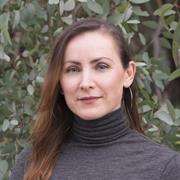
Dr. Rebecca Najdowski
Details
-
Department: School of Art
-
Campus: City Campus Australia
-
rebecca.najdowski@rmit.edu.au
-
ORCID: 0000-0002-0519-1366
Open to
- Masters Research or PhD student supervision
- Collaborative projects
About
Rebecca Najdowski is an artist, researcher, and curator who focuses on expanded photographic practice and environmental art. She is the Master of Photography Program Manager.
Rebecca’s work engages with how nature and the climate crisis are mediated through photographic technologies. In her practice, she uses the materiality of analogue and digital processes to alter habitual ways of seeing — and therefore relating to — nature. Rebecca uses experimental techniques such as exposing photo-materials with natural phenomena, harnessing the limitations of digital 3D scans of plants, or creating datasets to make AI artworks. Both a celebration and critique of imaging technologies, Rebecca’s work has addressed desert ecology, botanical specimens, natural phenomena like the sun, geothermal activity, rain, and imaginings of the universe.
Rebecca’s images, objects, and films have been presented internationally, including at the Museum Belvédère (Netherlands), Belfast Photo Festival (Northern Ireland). She was awarded a Fulbright Fellowship to Brazil and her practice has been supported by a fellowship with the Center for Creative Photography (Arizona, US) and through residencies at Banff Centre (Canada); the Institute for Electronic Art at Alfred University (New York, US); and Kala Art Institute (California, US).
Research fields
- 3606 Visual arts
- 3605 Screen and digital media
- 360503 Digital and electronic media art
- 360604 Photography, video and lens-based practice
UN sustainable development goals
- 13 Climate Action
Supervisor projects
- Environment Art & Cultural Ecologies
- 8 Feb 2023
Teaching interests
My teaching mission is to enable and support students to see beyond the surface of images and to use media as a tool for critical thinking. I have designed and developed more than ten undergraduate courses including Moving Image Studio, Material Thinking, and Contemporary Landscape. In my classes, I implement innovative teaching methods and incorporate emerging technologies to create dynamic learning environments. In recognition of my work in this space, in 2021 I received the College of Design and Social Context DVC Award for L&T Innovation: Concurrent Teaching. In 2024, I was awarded an Adobe x Creative Curriculum Grant (with Fiona Hillary) to develop the pilot project “Immersive Environmental Learning with Augmented Reality.”
Supervisor interest areas:
Expanded photography, generative AI, new media, immersive installation, video, art and science, environmental art, landscape


